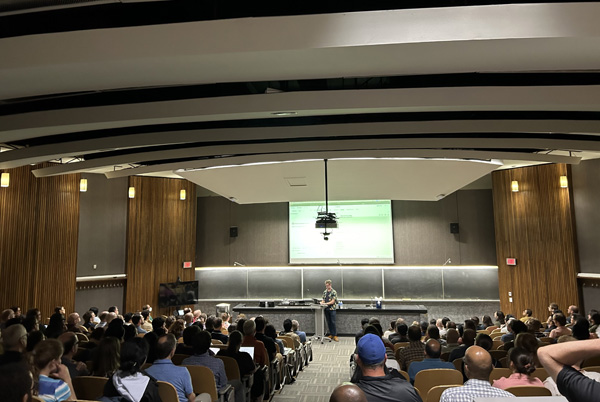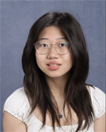Duke University hosts a global R community at the successful useR! 2025 conference

[A photo from a keynote presentation at the useR! 2025 conference. Photo Credit to Olivia Bak]
The useR! 2025 conference, hosted by Duke University in collaboration with the Duke Center for Computational Thinking, was held at Penn Pavilion in Durham, North Carolina, from August 8 to 10, 2025.
This annual international conference focuses on R, the programming language and environment for statistical computing and graphics.
R has long been a cornerstone of data analysis, visualization, and reproducible research.
Unlike other programming conferences, useR! distinguishes itself with its sole emphasis on R and its global community.
It covers themes ranging from technical methods to practical applications and balances deep technical content with a community-driven spirit.
Held as a hybrid event, useR! 2025 welcomed attendees both on-site at Duke University and online, allowing flexible participation across time zones and regions.
Hundreds of R users, developers, data scientists, academic researchers, statisticians, and students from around the world convened for three days of presentations, tutorials, and networking.
Attendees had the chance to gain industry insights from keynote talks by leading R experts, exchange ideas, develop new skills, and explore the latest innovative applications of the language.
Through five keynote presentations and over one hundred tutorial sessions, the conference covered a wide range of R topics, highlighting the growing role of AI and machine learning, cutting-edge programming applications, new developments within the R ecosystem, and new functionality that expands R’s capabilities.
One of the most anticipated sessions was the keynote by Hadley Wickham, a New Zealand statistician and Chief Scientist at Posit PBC.
In his talk, “I wrote this talk with an LLM,” Wickham explored how large language models (LLMs), a type of artificial intelligence (AI), can augment R workflows by accelerating prototyping and documentation, while emphasizing the continued importance of human expertise in an AI-driven era.
In response to a question about the future of R compared to Python, given Python’s ubiquity in LLMs, he said, “Obviously, there’s a lot more Python code in the world than R code. At the same time, only a small fraction of Python code deals with data analysis, and there’s enough R code out there that LLMs can do a pretty good job.”
He further noted, “There is a compelling argument that we’re in a post-language world. LLMs can translate between languages. I don’t think the entire world needs to rely on a single general-purpose programming language. It totally makes sense for communities to use smaller, more specialized tools for specialized tasks.”
For young professionals, mid-career learners, or anyone entering the world of LLMs, Wickham advised, “Engage with LLMs as tools. They can make you better programmers and data scientists, but it won’t happen magically. Using LLMs effectively is a new skill that you have to learn. The world is changing, and if we just say no and don’t engage, we’ll get left behind.”
The other four keynotes included Simon Urbanek on R in modern technologies and AI, Yanina Bellini Saibene on programming communities, Frauke Kreuter on public statistics challenges, and Will Landau on efficient simulation for clinical trial design.
Tutorials offered hands-on training across diverse topics, ranging from causal machine learning and genomic data analysis to debugging tools, survey methods, and workflow optimization.
These sessions helped participants apply new methods, test practical tools, and refine techniques for integration into their own work.
Networking was also central.
The schedule included coffee breaks and a social event at The Nasher Museum of Art, Duke University’s art museum, featuring hors d’oeuvres and drinks.
In particular, the R-Ladies networking event provided an especially valuable opportunity for women in the R community to connect, exchange ideas, and build support networks.
This year, useR! 2025 reinforced its role as a collaborative forum, bringing the global R community together to exchange knowledge, embrace emerging trends such as AI, and strengthen both professional and personal connections.

- Olivia Bak / Grade 10
- Woodson High School

![THE HERALD STUDENT REPORTERS [US]](/assets/images/logo_student_us.png)
![THE HERALD STUDENT REPORTERS [Canada]](/assets/images/logo_student_ca.png)
